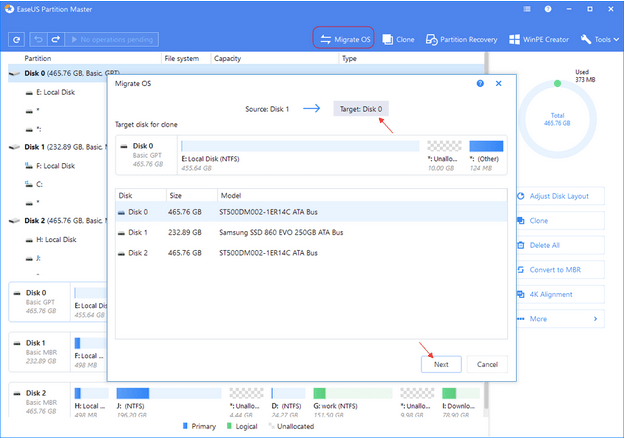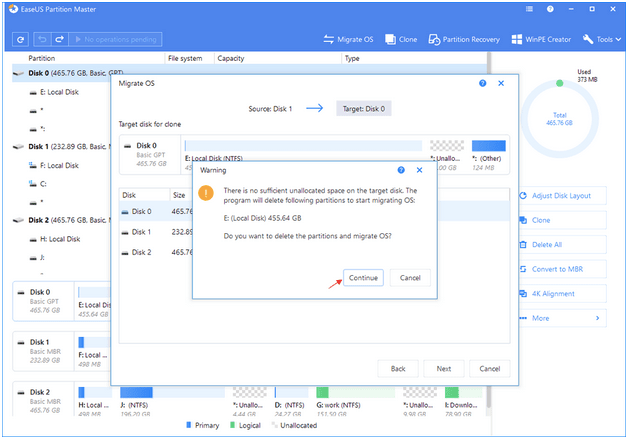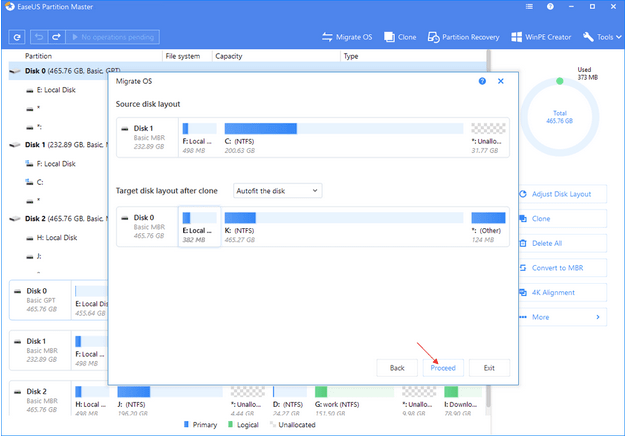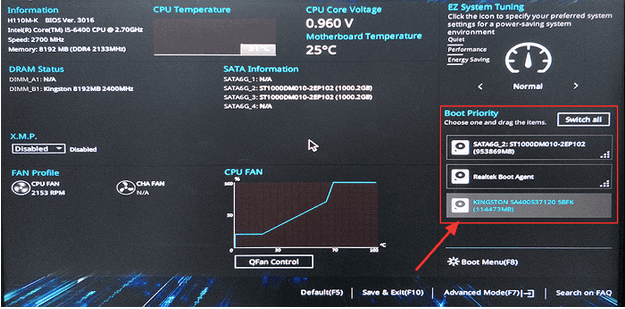If you are wondering how to transfer OS from HDD to SSD, we will suggest using EaseUS Partition Manager. It will effortlessly move the OS from hard disk to SSD without losing data.
If you own a computer that is now outdated but you are trying to keep all the data intact, the best bet for you will be to migrate the OS from HDD to SSD. As you can use the solid-state drive with the new computer and use all the data from the previous computer at a faster speed. In this blog, we will help you understand the process by using a third-party tool as it won’t be possible otherwise. We see EaseUS Partition Manager as one of the best ways to learn how to move Windows 10 from HDD to SSD. We need to make sure of a few things before moving on with the process-
- Clean your Hard drive.
- Check the size of your hard drive.
- Get an SSD for the size of your HDD.
- EaseUS Partition Manager.
- Take backup.
|
We would recommend using Advanced System Optimizer to tidy up your hard drive before migration. This is a necessary step as you will be able to filter out the unnecessary data from your system. Advanced System Optimizer is a powerful tool used for PC optimization. It can clear junk files and applications, fix the registry, and help in memory management. With its help, you can reduce the size of the data and declutter the storage disk space. |
A partition manager is needed to perform this action on your computer. Here we suggest using the best – EaseUS Partition Manager. It is a tool used widely among professionals. It can be used to manage partitions on your computer. It is capable of copying disk or partitions on your Windows PC. It can easily clone, resize, move, create, delete or format partitions to organize the hard disk of your system. It comes with a very useful feature – Migrate OS to SSD and this is how to transfer Windows 10 from HDD to SSD without losing data. This process will help you to boost your Windows speed by using the SSD.
The best features of EaseUS Partition Manager are –
- Resize, move, merge partitions.
- Clone, create, format, or delete partitions.
- Copy disk or partitions.
- Resize, extend, shrink or create dynamic volume.
- Migrate OS to SSD.
Also Read: 10 Best Disk Management Software for Windows 10, 8, 7
How to Migrate OS from HDD to SSD/HDD
Here we use the Migrate OS to SSD feature of EaseUS Partition Manager. It will help you in making the transfer without any data loss. So, let’s move forward to see how to migrate the OS from HDD to SSD using it. Remember to start with the steps after connecting your SSD to your PC and then download the tool on it.
Step 1: Download EaseUs Partition Manager from the button given below-
Step 2: Launch the application and then go to the Migrate OS button on the Top Bar.

Step 3: Now, the connected SSD will be shown in the Target disk options. Select it and then click on the Next button.
Step 4: Now, click on the Continue button for a Warning pop-up message.
Note: All the previous data and partitions on the target disk will be removed to take a backup in that case.

Step 5: Next, preview the layout on your SSD, here you are given customization options. Once done, click on the Proceed button.

The migration process will take its time to transfer and this is how to move OS from HDD to SSD.
Step 6: Now, restart your computer and enter BIOS Settings to boot from the cloned SSD.
Step 7: Under the Boot section, set the SSD as the boot drive.

Now save the changes and restart the computer.
This is how to migrate OS from HDD to SSD using EaseUS Partition Manager.
Also Read: Best Partition Recovery Software In 2021
Frequently Asked Questions-
Q1. How do I transfer my OS from HDD to SSD?
To transfer OS from HDD to SSD, it is important to take the necessary precautions. As there are chances of data loss. We recommend using a third party to perform this action in this blog, which makes it a much easier task.
Q2. How do I transfer Windows 10 from HDD to SSD?
It is possible to transfer Windows 10 from a hard disk drive (HDD) to a solid-state drive (SSD). To do so, you will need to use third-party software such as EaseUS Partition Manager.
Q3. Is it possible to transfer OS from HDD to SSD?
Yes, it is possible to transfer OS from HDD to SSD using EaseUS Partition Manager which comes equipped with the module – Migrate OS from SSD for the same.
Q4. Can a system C drive be moved to an SSD?
Yes, once you decide to select only a partition of your hard drive to be moved to SSD, it is possible to do so. For this, you need to use efficient third-party software as shown in this blog.
Q5. How to migrate OS from HDD to EaseUS Partition Master?
As EaseUs Partition Manager dedicates a module to the very task, it becomes easier to migrate OS from the hard disk drive. Using the aforementioned steps you can easily transfer OS from HDD to an SSD
Wrapping Up-
Migrating OS is a tedious job and it is also not simple, but using an SSD you can improve user experience with a smoother workflow in a new computer. EaseUs Partition Manager will help you in moving OS from HDD to SSD easily using its dedicated module. Get this tool now and transfer the OS quickly-
We hope this article will help you learn how to migrate OS from HDD to SSD. We would like to know your views on this post to make it more useful. Your suggestions and comments are welcome in the comment section below. Share the information with your friends and others by sharing the article on social media.
We love to hear from you!
We are on Facebook, Twitter, and YouTube. For any queries or suggestions, please let us know in the comments section below. We love to get back to you with a solution. We regularly post tips and tricks along with solutions to common issues related to technology.
Related Topics-
How to Fix Service Control Manager Error on Windows 10
Cannot Add a New User Account on Windows 10? Here’s the Fix!




 Subscribe Now & Never Miss The Latest Tech Updates!
Subscribe Now & Never Miss The Latest Tech Updates!